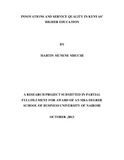| dc.contributor.author | Mbuchi, Martin M | |
| dc.date.accessioned | 2013-11-11T08:48:17Z | |
| dc.date.available | 2013-11-11T08:48:17Z | |
| dc.date.issued | 2013-10 | |
| dc.identifier.citation | Degree of Master of Business Administration | en |
| dc.identifier.uri | http://erepository.uonbi.ac.ke:8080/xmlui/handle/123456789/58411 | |
| dc.description | A research project submitted in partial
fulfillment for award of an MBA Degree
School of Business University of Nairobi | en |
| dc.description.abstract | Innovations and service quality in higher education has been important for decades. In Kenya
quality in higher education was embraced some years back by facilitating vigorous process and
standards such as enterprise resource planning (ERP), international organization for
standardization (ISO). The study sought to determine the relationship between innovations and
service quality in Kenya’s’ higher education. Descriptive design was adopted with fourteen
universities considered for the sample. Simple random sampling was used and a total of 42
questionnaires were administered. All the 42 questionnaires were returned. Analysis and various
tests were done using varied statistical tools.
Research findings indicate that innovation in universities remains the biggest challenge to
quality. Some of the innovation types like services are poor. The applicability of innovation in
driving university service quality such as internet based financial services is critical.
The findings also indicated weak relationships between innovation and service quality in
universities. The innovations constraints in both the established universities and the constituent
colleges continue to be felt.
The need to address innovation and service quality gaps as well encourage continuous
professional development of the staff is therefore urgent in this area. Universities need to set
aside proportional amount of funds for staff development, so as to encourage staff to
continuously undertake research on innovations.
Of importance also is embracing e-leaning as a model for knowledge dissemination at
universities. E-content development is a clear driver that will facilitate greater outreach for
university education in Kenya, and attend to the long-term innovations and service quality gaps
that cannot be adequately addressed with the growth in demand for higher education in Kenya. | en |
| dc.language.iso | en | en |
| dc.publisher | University of Nairobi | en |
| dc.title | Innovations and Service Quality in Kenya’s’ Higher Education | en |
| dc.type | Thesis | en |
| local.publisher | School of Business | en |

